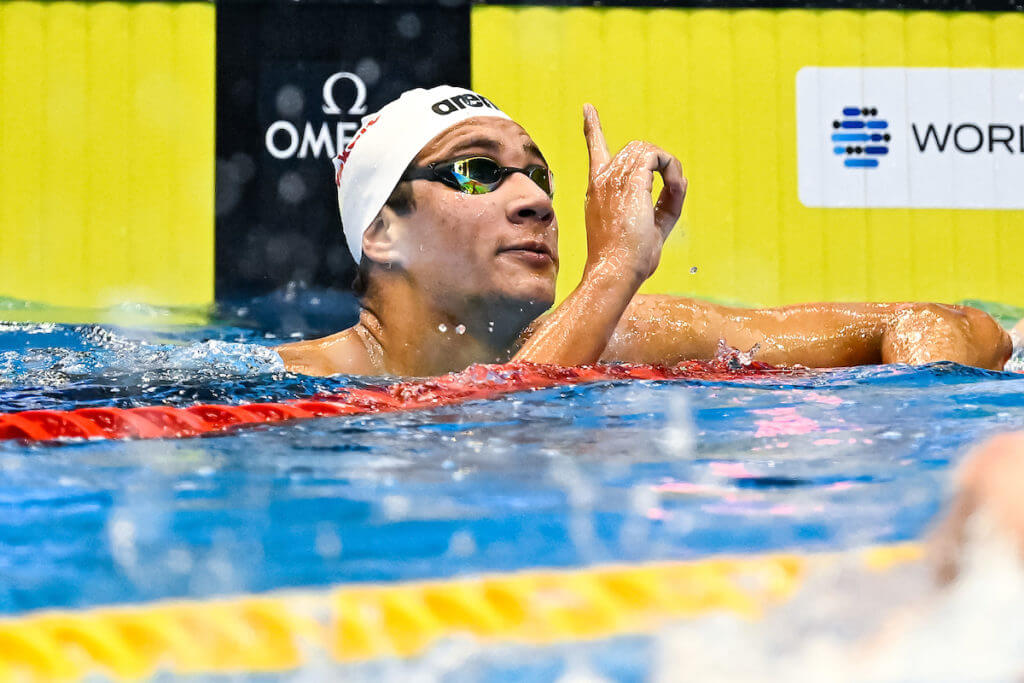Tokyo Times Left Behind: Ahmed Hafnaoui, Summer McIntosh Among Those Responsible for Generational Drops

Tokyo Times Left Behind: Ahmed Hafnaoui, Summer McIntosh Among Those Responsible for Generational Drops
After each major championship meet, a new bar is set. The winning time from an Olympics or World Championships becomes the standard that swimmers around the world look to surpass, knowing what it now takes to reach the top of the podium. Sometimes, an event can stagnate for long stretches, but those are balanced by periods of rapid improvements, with so many swimmers dropping their best times that the time required to win Olympic gold would not even reach the podium at the World Championships two years later.
That was the case in four men’s events at last month’s World Championships, where improvements in distance freestyle have revolutionized those events while one particular swimmer has been responsible for the elevation of the men’s 400 IM. For the women, all gold-medal times from the Tokyo Games would still have reached the podium in Fukuoka, but three events showed such improvement that they would have been only good enough for bronze.
Men’s Events
400 Freestyle: Tunisia’s Ahmed Hafnaoui shocked the world in Tokyo with his gold-medal upset win from lane eight, but in his return to major competition two years later, he found an event with the bar significantly raised. As Australia’s Sam Short out-dueled Hafnaoui for gold, with both men moving into the all-time top-five in history in the event, Germany’s Lukas Martens won bronze in 3:42.20, more than one second clear of Hafnaoui’s winning time from Tokyo (3:43.36).
400 Individual Medley: A Frenchman has redefined the limits of the 400 IM, with Leon Marchand obliterating Michael Phelps’ final world record last month. American Carson Foster is the clear No. 2 in the event, having gone 4:06.56 exactly in two consecutive Worlds finals, and Japan’s Daiya Seto earned bronze in 4:09.41. That was actually surprisingly slow for a bronze-medal time, but it still beat the 4:09.42 that Chase Kalisz swam to win gold in Tokyo, a race where no one else broke 4:10 seven out of the eight men (everyone but Kalisz) went slower in the final than in prelims. Thanks to Marchand, this event is now unrecognizable.
800 Freestyle: The jump in the 800 free has happened twice: all three medalists at last year’s World Championships beat Bobby Finke’s Tokyo winning time of 7:41.87, and once again this year, all three surpassed Finke’s 2022 mark of 7:39.36, with Finke’s latest American-record time of 7:38.67 only good enough for bronze. The men at the helm of the jump? Same as in the 400 free, with Hafnaoui claiming gold in a ridiculous 7:37.00 while Short got silver, his time of 7:37.67 knocking off the national record held by the great Grant Hackett.
1500 Freestyle: Finke barely broke 14:40 in winning Olympic gold in this event in Tokyo, but this year, he and Hafnaoui almost broke the world record as they each hit 14:31s in an unbelievable race to the finish in Fukuoka. Short went 14:37.28 for bronze, almost 2.5 seconds faster than Finke in Tokyo, and the standard to reach the podium could have been even quicker, with Florian Wellbrock and Dan Wiffen each hitting 14:34s earlier in the year.
Women’s Events
200 Individual Medley: The Olympic final in this event was one of the slowest global medal races in a decade as Japan’s Yui Ohashi out-dueled American Alex Walsh for gold, with a winning time of 2:08.52. Now, though, four women are comfortably under 2:08. Americans Kate Douglass and Walsh went 1-2 in a World Championship final missing two key contenders in Summer McIntosh and Kaylee McKeown, with McIntosh prioritizing other events because of the racing schedule and McKeown losing a gold-medal chance with a semifinal disqualification. Yu Yiting ended up with bronze in 2:08.74, just off Yui’s Tokyo time, but a full-strength field likely leaves 2:08 medalists behind.
200 Freestyle: The 2021 Olympic final of the 200 free was an incredible race as Australia’s Ariarne Titmus overtook Hong Kong’s Siobhan Haughey for Olympic gold, with both finishing in 1:53s, but two years later, Haughey can go 1:53.96 in a Worlds final, just four hundredths slower than in Tokyo, and miss the podium entirely. McIntosh at 1:53.65, only 15-hundredths off of Titmus’ winning mark from those Games, managed to secure bronze. But historic swims at the top left these two incredible women behind, with Mollie O’Callaghan knocking off a 14-year-old world record while Titmus went the third-quickest mark ever.
400 Individual Medley: McIntosh, who has turned 17 since Worlds, seems to be at the center of all of the women’s most-improved races. In the 400 IM, her stunning swimming has brought the world record down to 4:25.87, and she clocked 4:27.11 for the third-quickest mark ever to win a second consecutive world title this year. Meanwhile, American Katie Grimes finished with silver (also for the second consecutive year) in 4:31.41, nowhere close to McIntosh but well ahead of the 4:32.08 that Yui swam on the way to gold in Tokyo. Aussie Jenna Forrester, meanwhile, was only two tenths off Yui’s time as she claimed bronze.



